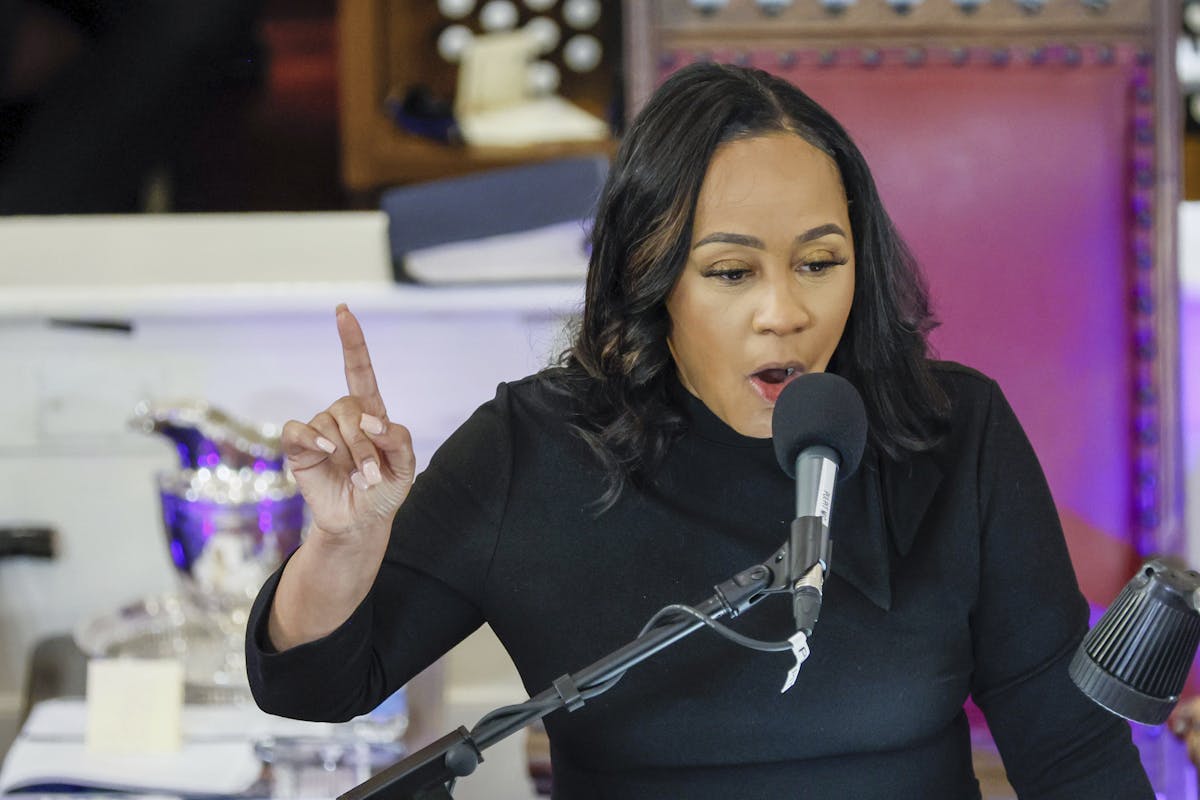Fani Willis Urges Lawmakers To ‘Learn the Law’ — but Could She Be Removed From Trump Case for Playing the Race Card?
The latest defiance from the district attorney could prove detrimental to her desire to avoid disqualification.

District Attorney Fani Willis’s refusal to honor any subpoena that could be issued by the Georgia senate, which is investigating her for her prosecution of President Trump, underscores the double-down stance of a defiant prosecutor who could be yet disqualified. Her latest comments could grant her critics further ballast.
The message of prospective noncompliance was broadcast at a press conference with Black faith leaders — she is running for re-election — held by the district attorney on the steps of Big Bethel AME Church. That is where, on Martin Luther King Jr. Day, she delivered an oration in which she accused her foes of “playing the race card.”
In that homily, she also defended her former boyfriend, Nathan Wade, whom she hired as special prosecutor. “God wasn’t it them” — meaning her critics — “that attacked this lawyer of impeccable credentials? The Black man I chose has been a judge more than 10 years. Been in private practice more than 20. Some will never see a Black man as qualified, no matter his achievements.” Mr. Wade has never prosecuted a felony case, but was paid more than $650,000 by Ms. Willis’s office.
That rhetoric, Mr. Trump will argue to the Georgia Court of Appeals, is, along with her secret romance with the special prosecutor she picked to try the case, Nathan Wade, grounds for disqualification. On Wednesday, the review tribunal granted the 45th president’s request to consider whether the trial judge, Scott McAfee, erred in allowing Ms. Willis to stay on the case.
Plus, too, Ms. Willis faces scrutiny from the Georgia senate’s special committee on investigations over her office’s use of taxpayer funds in the prosecution of Mr. Trump. She is also being investigated for misuse of federal funds by Congressman Jim Jordan. The chairman of the Georgia committee, Bill Coswert, told WSB-TV at Atlanta: “If she’s not willing to come and explain her conduct, then we will subpoena her and ask her to come and require her to come.”
Ms. Willis’s response did not mince words. “First of all,” she declared, “I don’t even think they have the authority to subpoena me, but they need to learn the law. I will not appear to do anything that is unlawful, and I have not broken the law in any way. I’m sorry folks get pissed off that everybody gets treated evenly.”
That last line could find its way into Mr. Trump’s appellate case against Ms. Willis, whom he accuses of “forensic misconduct” on account of her comments suggesting that the defendants in the case are racist. Judge McAfee found those remarks “legally improper” but demurred from holding that her speech at Big Bethel “crossed the line to the point where the Defendants have been denied the opportunity for a fundamentally fair trial.”
Judge McAfee also reckoned that “providing this type of public comment creates dangerous waters for the District Attorney to wade further into.” He even suggested that the defendants could move for a gag order to be imposed on Ms. Willis. He reasons that the “time may well have arrived for an order preventing the State from mentioning the case in any public forum.”
Ms. Willis has also reportedly employed racial language in private settings. WAGA-TV reports that in January, in an email exchange with Mr. Trump’s attorney, Steven Sadow, over timely delivery of documents, the district attorney wrote, “In the legal community (and the world at large), some people will never be able to respect African Americans and/or women as their equal and counterpart. That is a burden you do not experience.”
Mr. Sadow replied to that observation by declaring, “No defense counsel has treated you or your prosecutors in a disrespectful or condescending manner … the relationship among counsel in our case has nothing to do with race or gender, nor should it.” He alleges, though, that Ms. Willis has engaged in racially charged rhetoric to poison the Fulton County jury pool. The last Census found that Fulton County, which includes downtown Atlanta, is a majority-minority county, with 60 percent of its population being people of color.
Judge McAfee notes that no prosecutor at Fulton County has ever been disqualified for forensic misconduct. He lamented that he was “unmoored from precedent,” but found the relevant inquiry to be “whether such remarks were part of a calculated plan evincing a design to prejudice the defendant in the minds of the jurors, or whether such remarks were inadvertent utterances.”
The judge, though, acknowledges that his holding was “limited,” and marbled it with caveats about the “unexplored” nature of this body of law and critiques of Ms. Willis’s conduct. The Court of Appeals could yet find him too credulous of the district attorney’s intentions. Ms. Willis’s office did not respond by press time to a request for comment.

